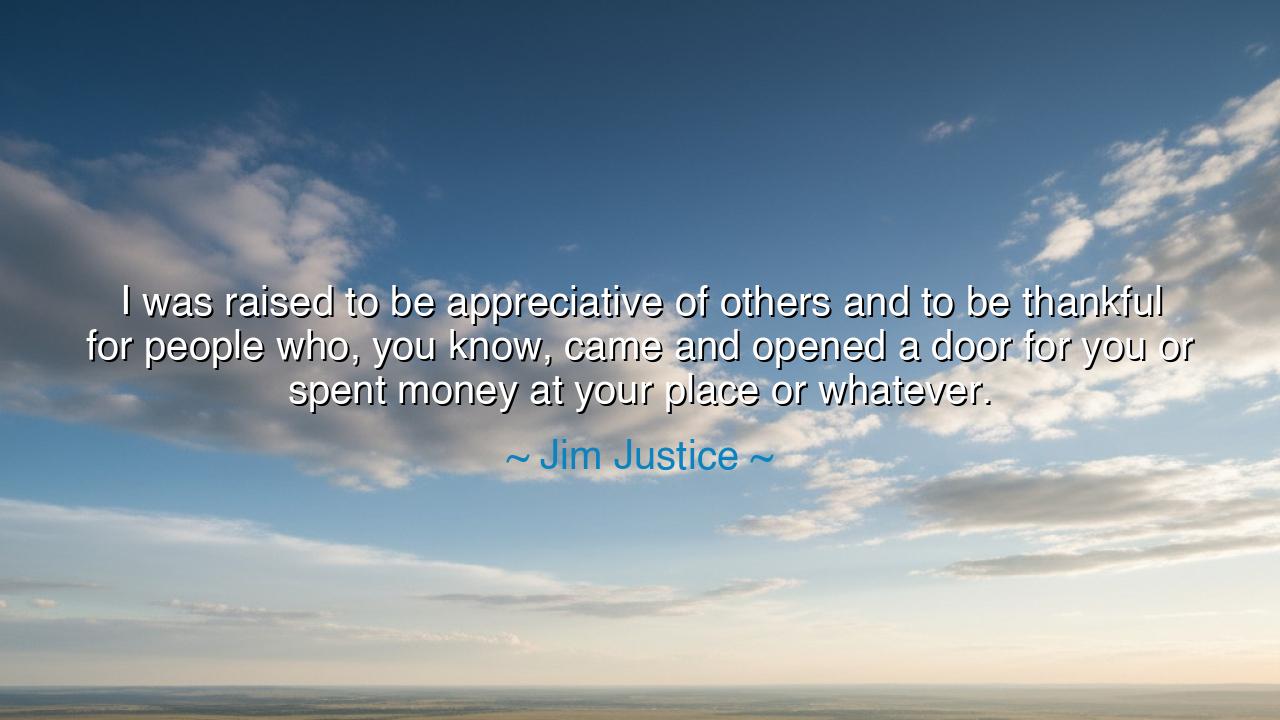
I was raised to be appreciative of others and to be thankful for
I was raised to be appreciative of others and to be thankful for people who, you know, came and opened a door for you or spent money at your place or whatever.






Hear the words of Jim Justice, spoken with the humility of a man who remembers the lessons of his upbringing: “I was raised to be appreciative of others and to be thankful for people who, you know, came and opened a door for you or spent money at your place or whatever.” In these simple words lies a truth that the ancients cherished but that many in our age forget: greatness is not forged by power alone, but by gratitude, courtesy, and respect for even the smallest acts of kindness. To be appreciative is to acknowledge the invisible ties that bind humanity together, ties woven not only through grand deeds but through gestures as small as a door held open.
The ancients understood well the sacredness of such gestures. In Greece, hospitality—xenia—was seen as a divine law. To welcome the stranger, to respect the guest, to honor the giver of even the smallest gift, was to participate in the order of the gods themselves. Likewise, in Rome, the principle of gratia shaped society, reminding every citizen that mutual respect and obligation were the foundations of peace. Justice’s words echo these traditions: to be thankful for others is not a mere formality, but an acknowledgment of the divine weight carried by even the simplest human interactions.
Consider the story of Abraham Lincoln, who in his early years worked as a store clerk. It is said that one day he accidentally shortchanged a customer by a few pennies. Upon realizing his error, he walked miles to return the difference. To some, this seemed excessive for such a small matter. But in truth, it was the spirit of appreciation—the recognition that even the least act of trust deserved respect—that shaped him into the man who later bore the burdens of a divided nation. In the same way, Justice’s upbringing taught him to value not only the mighty but also the humble, the unseen, the everyday gestures that sustain society.
The phrase “opened a door for you” is more than literal. It is a symbol of opportunity and kindness. To be thankful for such acts is to understand that no person rises alone, and that even the most successful lives are built upon the unseen courtesy of others. A door held open can mean more than convenience—it can mean welcome, recognition, or dignity bestowed upon another. To ignore such gestures is to deny our shared humanity; to honor them is to build a culture of respect and humility.
So too with the phrase “spent money at your place.” In this, Justice reminds us that commerce is not only transaction but relationship. When one supports the labor of another—by buying their goods, by engaging their service—this act, too, deserves gratitude. For every livelihood depends upon the support of others, and to be appreciative is to acknowledge that one’s success is not born of self alone but of the trust and generosity of a community.
The lesson for us, then, is powerful in its simplicity: cultivate gratitude in all things, great and small. Be mindful of the door held open, the kind word spoken, the trust shown, the support given. Such acts may seem ordinary, but they are the mortar that binds together the stones of civilization. Without them, walls crumble; with them, societies endure. Gratitude is the soil in which kindness grows, and kindness, in turn, sustains peace.
Practical wisdom follows: each day, take note of the gestures others make toward you, however small. Speak thanks aloud, not only in thought but in word, for gratitude unspoken is easily forgotten. Be appreciative in business, in family, in friendship. Recognize that every act of respect deserves acknowledgment, and that by honoring the small, you strengthen the great.
Thus, Jim Justice’s words rise beyond personal reflection into timeless teaching: “I was raised to be appreciative of others and to be thankful for people.” It is a call to humility, to gratitude, to the recognition that greatness is built upon the countless kindnesses of others. Be thankful in all things, for in gratitude lies the strength of community, the nobility of character, and the path to lasting honor.






AAdministratorAdministrator
Welcome, honored guests. Please leave a comment, we will respond soon